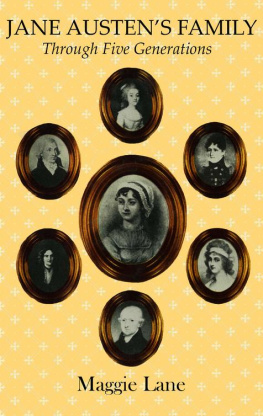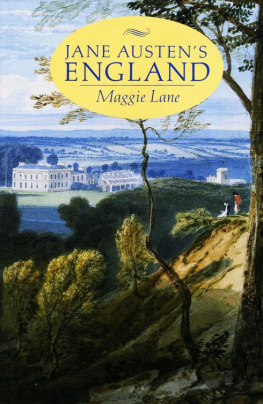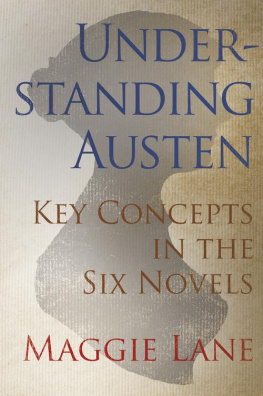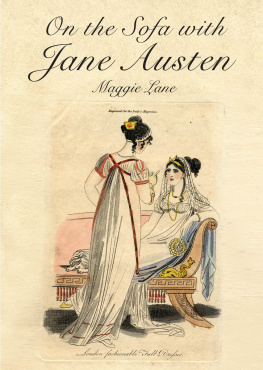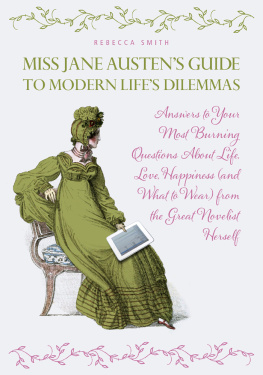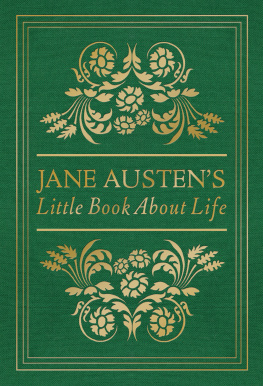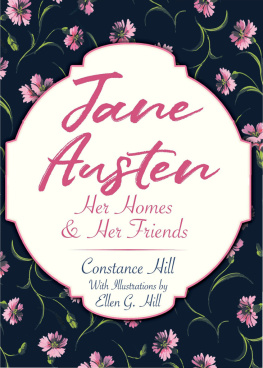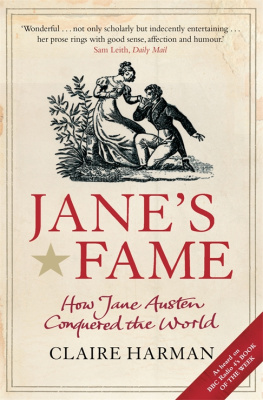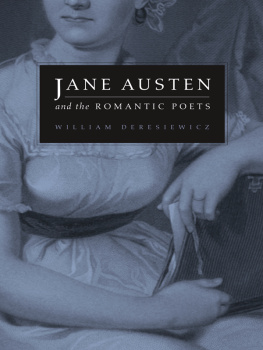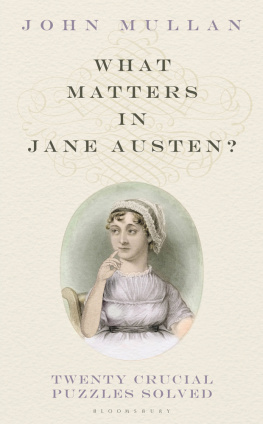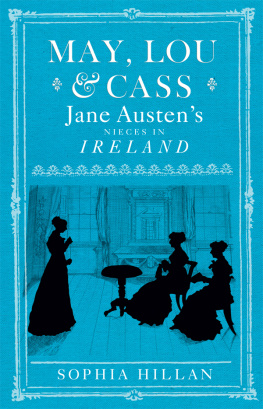Maggie Lane - Jane Austens Family
Here you can read online Maggie Lane - Jane Austens Family full text of the book (entire story) in english for free. Download pdf and epub, get meaning, cover and reviews about this ebook. year: 2014, publisher: Robert Hale, genre: Non-fiction. Description of the work, (preface) as well as reviews are available. Best literature library LitArk.com created for fans of good reading and offers a wide selection of genres:
Romance novel
Science fiction
Adventure
Detective
Science
History
Home and family
Prose
Art
Politics
Computer
Non-fiction
Religion
Business
Children
Humor
Choose a favorite category and find really read worthwhile books. Enjoy immersion in the world of imagination, feel the emotions of the characters or learn something new for yourself, make an fascinating discovery.
- Book:Jane Austens Family
- Author:
- Publisher:Robert Hale
- Genre:
- Year:2014
- Rating:5 / 5
- Favourites:Add to favourites
- Your mark:
- 100
- 1
- 2
- 3
- 4
- 5
Jane Austens Family: summary, description and annotation
We offer to read an annotation, description, summary or preface (depends on what the author of the book "Jane Austens Family" wrote himself). If you haven't found the necessary information about the book — write in the comments, we will try to find it.
This book offers an intimate and intriguing account of Jane Austens relations, from 1704, when her great-grandmother was left a widow with six children to support, through to 1870, and the destinies of her many nephews and nieces. Drawing extensively on letters and memoirs written by the Austen family over a period of 150 years, this book traces the development of the family from vigorous Georgian opportunism to respectable Victorian gentility.
Jane Austens Family — read online for free the complete book (whole text) full work
Below is the text of the book, divided by pages. System saving the place of the last page read, allows you to conveniently read the book "Jane Austens Family" online for free, without having to search again every time where you left off. Put a bookmark, and you can go to the page where you finished reading at any time.
Font size:
Interval:
Bookmark:
To the delight of dwelling in the Austens world, which has constituted my primary satisfaction in writing this book has been added another, quite unlooked-for gratification: the generosity and friendly interest with which my enquiries and pleas for help have invariably been met. Books, like babies, bring out the best in people; it seems that everybody takes pleasure in contributing towards a safe delivery.
I would like to record my sincere gratitude to Brian Southam, for his early advice and encouragement; to G.P. Hoole, local historian of Tonbridge, for so generously putting his researches at my disposal; to Lt-Col J.H. Smart, Clerk to the Governors of Sevenoaks School, for lending me his only copy of the schools history; and to the Reverend Mervyn Smith, Rector of Horsmonden for sharing his knowledge and parish.
Among the descendants of the Austen family, I am warmly grateful to Diana (ne Hubback) and David Hopkinson for their friendly assistance and hospitality and for allowing me to read and make notes from their manuscript biography of Catherine Hubback and other family papers; to Mr and Mrs Lawrence Imprey for showing me many family documents, and allowing me to quote from the AustenPapers; and to Joan Austen-Leigh (Mrs Mason Hurley) for supplying me with much useful information, and for instigating a correspondence that is an unfailing inspiration. I am also grateful to the descendants of Sir Francis Austen for allowing me to quote from his Memoirs.
For permission to use and quote from her invaluable work Jane AustensKindred I am deeply indebted to Joan Corder. Quotations from JaneAustensLetters and MinorWorks are made by kind permission of the Oxford University Press.
I would like to thank the Jane Austen Memorial Trust for permission to quote from Caroline Austens Reminiscences and MyAuntJaneAusten. Sir Hugh Smiley, Honorary Secretary of the Jane Austen Society, deserves my special thanks for the unwearied way he has answered all my correspondence.
The manuscript poem of James Austen is quote with kind permission of the Warden and Fellows of Winchester College, and I am grateful to the Librarian, Paul Yeats-Edwards, for his assistance. I would also like to record my thanks to Susan Garland of Kent County Archives for transcribing parish register entries and to the staff of Bristol Central Library for acquiring rare books and helping direct my researches.
An elegant sufficiency, content,
Retirement, rural quiet, friendship, books,
Ease and alternate labour, useful life,
Progressive virtue, and approving Heaven!
Thomson, TheSeasons: Spring, 1.1161
Few detailed records exist of ordinary family life in the century and a half which can roughly be said to comprise the Georgian age. Before the explosion of middle-class numbers and the spread of education which occurred in Victorian times and which resulted in a rich crop of letters and memoirs of that period, such documents as survive tend to concern only families who were aristocratic or otherwise famous.
The Austen correspondence, tracing the lives of five or six generations, from the beginning of the eighteenth century to the middle of the nineteenth, therefore possesses a rarity value in addition to its intrinsic interest. No comparable record remains which is at once so early, so continuous and so descriptive of everyday matters for the middling people of Georgian England, to use Walpoles phrase. Their surviving letters, though only a fraction of what must have passed between the many members of this highly literate and affectionately united family, are so fortunately spread over a span of 150 years that they succeed in bringing vividly to life a whole saga of shifting generations and subtly changing fortunes. From them, and other evidence, we gain a composite picture of talented, vigorous and attractive individuals, and a unique insight into the age in which they lived.
The Austens were not an over-worldly or ambitious race. They did not seek to found a great dynasty or to achieve power or public honours. Simple private happiness, a set of duties marked out and performed, and sufficient income to enjoy a fair share of the comforts and elegancies of life in which their period so much excelled, formed the height of Austen ambition.
Few of them were born to ease and affluence. Mostly they had to make their own ways in a world which they did not see as owing them a living; for some there were long struggles, for others moments of panic. A bank failure, a threatened lawsuit, a disappointing will, the premature death of a parent: all these things could and did bring disaster very close, and with no state safety-net, only the solidarity of the extended family gave the individual any protection.
So it was with a mixture of mutual help and self-reliance that the Austens succeeded not only in creating agreeable lives for themselves, but, in their various roles as doctor and lawyer, banker and clergyman, soldier and sailor, farmer and landowner in contributing significantly to the safety and prosperity of their country.
They were a remarkably united family. Not only prudence but real attachment bound them together. They lived in times of increasing mobility; during the Georgian period the Austens spread from Kent, where they had long been settled and from which they are never known to have ventured before, to seek their livings and their pleasures in Hampshire and Bath, London and Paris, in India and on the high seas of Nelsons navy. Yet even when separated by long distances, they kept in touch with each other, despite the difficulties of travel and communications: embarking on family visits, writing affectionate letters and assisting one another financially according to their various circumstances.
In their snug parsonages, their improved cottages, their elegant town houses and their tranquil country estates, they led what may seem to us an idyllic existence. The poverty of the majority of the people and the exploitation of their labour which enabled the few to live in comfort, they were happily able to view in all sincerity as the God-given order of things. This is not to say that they were negligent in relieving distress; they took their obligations to those less fortunate than themselves very seriously, and treated their own servants with uncommon humanity. But they could enjoy their privileges, having worked hard to secure them, untroubled by what we should today call a social conscience. In any case, though bad enough, conditions for the labouring poor before the Industrial Revolution was underway were not so horrifying as they were later to become.
Both the man-made and the natural world were at the height of their beauty and their harmony one with the other. Builders and craftsmen seemed incapable of producing anything ugly, and the countryside was tamed but not despoiled. Dr A.L. Rowse has said that the England of this time makes the heart ache to think of. The tyranny of nature was at last becoming sufficiently subdued for her glories to be appreciated, rather than her caprices endured; for the first time a sizeable proportion of the population had the leisure and the learning to lead truly cultivated lives. Not many can have been better mentally equipped to do so than the Austens.
There was a refreshing intellectual liberty in the air. The eighteenth-century way of thinking was balanced, rational, robust. Free alike from the bigotry and coarseness of the preceding ages, and the hypocrisy and repression of the one which followed, the Georgian period had also the advantage over our own of looking with cheerful confidence to the future. Individual life may have been more precarious, but the continuity of society as a whole was unquestionable, whilst their belief in the benefits of gradual progress must have conferred a peace of mind which we today can only yearn for.
Font size:
Interval:
Bookmark:
Similar books «Jane Austens Family»
Look at similar books to Jane Austens Family. We have selected literature similar in name and meaning in the hope of providing readers with more options to find new, interesting, not yet read works.
Discussion, reviews of the book Jane Austens Family and just readers' own opinions. Leave your comments, write what you think about the work, its meaning or the main characters. Specify what exactly you liked and what you didn't like, and why you think so.

